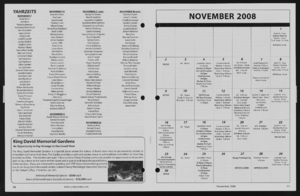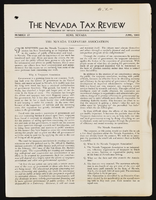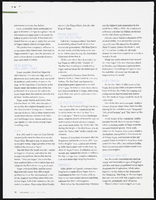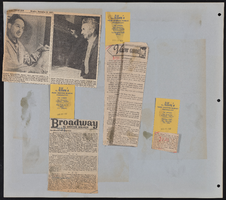Search the Special Collections and Archives Portal
Search Results

Transcript of interview with Dorothy Pitzer by Judy Harrell, May 19, 2014
Date
Archival Collection
Description
Born in Chicago and raised in small Illinois towns, Dorothy Karper met her future husband, Doug Pitzer, when they went to rival high schools. She began nurses’ training in Dixon, Illinois, and immediately after her 1950 graduation, Dorothy and Doug married. Although he never had to go overseas, the Korean War interrupted their married life, and Doug enlisted in the Air Force and went to basic training in Texas. The couple arrived in Las Vegas in July 1954, when Doug was transferred to Nellis Air Force Base. Dorothy worked as a nurse at Las Vegas Hospital and Clinic 1954-1957 and later worked for a private obstetrics practice. From 1954 until Doug’s discharge in 1957 the Pitzers lived in Kelso-Turner Terrace military housing. In 1956 they purchased a new house in Twin Lakes, but they didn't move in until 1957, after the streets were put in. They remained in their Twin Lakes house until they moved into Dorothy’s present house on Burton Avenue, between West Charleston Boulevard
Text

Mike Meade interview, February 28, 1977: transcript
Date
Archival Collection
Description
On February 28, 1977, collector Steve Gortz interviewed Mike Meade (b. September 16, 1950 in San Francisco, California) about his life in Nevada. Meade speaks about growing up in Tonopah, Nevada before its decline in population, his move to Elko, Nevada and eventually to the city of Las Vegas. Moreover, he talks about the development of the Strip, the differences between Las Vegas and rural Nevada, as well as the changing environmental landscape. Meade also spends time discussing the controversy surrounding the University of Nevada, Las Vegas (UNLV) dormitory at the time of this interview, the attitude of locals, and his opinion on brothels and prostitution. Lastly, Meade talks about the city’s pollution, the sports and recreation throughout the whole of the state and ends by reading a poem about Nevada from a Bicentennial book.
Text

Transcript of interview with John L. Houck by Perry L. Smith, March 14, 1981
Date
Archival Collection
Description
On March 14, 1981, collector Perry L. Smith interviewed police officer, John L. Houck, (born May 11th, 1944 in Butte, Montana) in his home in Las Vegas, Nevada. This interview offers an overview of the history of Las Vegas and insider details on early Las Vegas police work. The interview concludes with a discussion on Henderson and Boulder City.
Text

Transcript of interview with Norma Friedman by Barbara Tabach, November 19, 2015 and April 06, 2016
Date
Archival Collection
Description
It was a scorching Fourth of July, when Norma (n?e Adler) and Leon Friedman rolled into their new home of Las Vegas in 1973. Nevertheless, they were content with leaving Gary, Indiana behind, and starting fresh with the family?s new ownership of Walker Furniture. Norma recalls her first stop in checking out Las Vegas was to visit the synagogue ? Temple Beth Sholom being the only option. Her oldest son would soon become a bar mitzvah. Feeling good about that, she and her sister-in-law who was also relocating to Las Vegas for the furniture business, searched for new homes. Norma settled into the community through volunteer work as well as through employment outside the family business. She worked in the real estate briefly and in a jewelry store at the Dunes. A natural organizer, she immersed herself in religious and civic organizations including the Jewish Federation, Jewish Family Service Agency, and volunteering at Selma Bartlett Elementary School in Henderson. Norma shares stories of her Jewish heritage and upbringing in Pittsburgh, the decision to move to Las Vegas, making fast friendships during her life in Las Vegas and the joy she has in traveling the world with Leon, who passed in 2004. In 2017, Norma was honored by the Jewish Family Service Agency.
Text

Jeanettee L. Del Rosario oral history interview: transcript
Date
Archival Collection
Description
Oral history interview with Jeanettee L. Del Rosario conducted by Alessandra Del Rosario on December 6, 2021 for Reflections: The Las Vegas Asian American and Pacific Islander Oral History Project. Jeanettee Del Rosario talks about her family life with nine siblings and her upbringing in Urdaneta City, Pangasinan province, Philippines. She shares her educational background in hotel and restaurant management and, after immigrating to Las Vegas, Nevada in 2006, the different hotel positions she has held in the city. Jeanettee Del Rosario discusses the process of immigration, language barriers, and missing her family in the Philippines. She also talks about Filipino traditions of respect, barangay fiestas, cultural foods, and religion.
Text
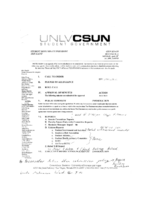
Meeting minutes for Consolidated Student Senate, University of Nevada, Las Vegas, April 28, 2008
Date
Archival Collection
Description
Text

